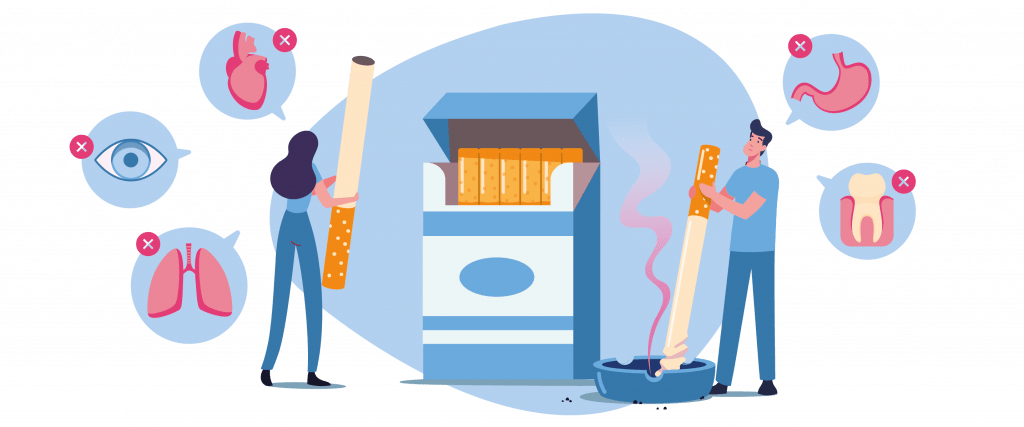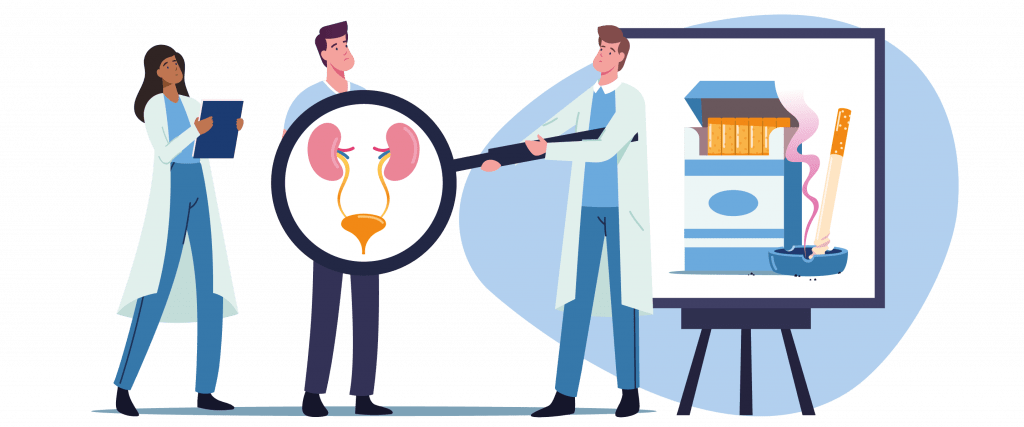Does cigarette smoking cause or worsen an overactive bladder?
Nowadays, it’s common knowledge that smoking cigarettes negatively impacts your overall health. Still, the effects on bladder health are often overlooked, on both those with an overactive bladder (also known as urinary incontinence) and those with a healthy bladder. Keep reading for an overview of why cigarettes are harmful and how smoking affects urinary incontinence.
What are the health risks of smoking cigarettes?
Cigarette smoking is one of the largest causes of death and illness in the UK, with about 78,000 people dying of smoking-related illnesses every year.1 In Europe, there are nearly 700,000 deaths due to smoking each year.2 There are 69 chemicals in cigarette smoke that cause cancer3 and smoking can increase the risk of developing various diseases and conditions, many of which are chronic (long-term) and can be fatal, including:
- cancer
- heart disease and stroke
- diabetes
- obstructed airflow from the lungs (COPD)
- eye problems
- rheumatoid arthritis4

Additionally, if you are trying to conceive or are pregnant, then smoking can be detrimental to your health. Smoking can affect sperm quality and thus decrease fertility.5 It can also cause erectile dysfunction (also known as impotence), as it damages the blood vessels in the penis6, making it more difficult to conceive. For women, it can make it difficult to get pregnant, and, once pregnant, it can increase the chance of congenital disabilities, stillbirths and miscarriages.7
Therefore, it’s clear that smoking tobacco is not good for your health in general, and it would be advisable to quit smoking. However, beyond commonly known risks, how does it affect your bladder health? Does it cause urinary incontinence or further irritate an overactive bladder?

Impact of smoking on bladder health
Of course, quitting (or not starting) smoking is generally advised for your health, but if you have a urologic (bladder) condition, it is also recommended. These conditions include:
- bladder and kidney cancers. As we said above, cigarette smoke contains many cancer-causing chemicals, so it can increase your risk of bladder and kidney cancers
- kidney stones. These can be incredibly painful, and smoking has been shown to increase the instances of kidney stones
- interstitial cystitis, which is where you get recurring urinary tract infections (UTIs) and find it painful to pee.8 Learn more on UTIs here.

- overactive bladder. Smoking irritates the bladder and can cause coughing fits which, in turn, cause more leaks.9 This happens because the chronic cough that a lot of smokers develop puts pressure on your pelvic floor muscles, causing them to weaken, which then increases the likelihood of experiencing stress incontinence (leaks when pressure is put on your bladder, such as when you cough or sneeze). As cigarette smoke is a bladder irritant, it can also cause a more frequent urge to go to the toilet10
If you are experiencing symptoms of an overactive bladder, iD has a range of discreet and comfortable continence products, approved by dermatologists, to manage leaks. Shop the collection of pads and pants here.
So, if you are a smoker, there are clear reasons why quitting would be beneficial for your general health, as well as your bladder health. iD would recommend speaking to a healthcare professional if you are considering quitting smoking, as they can provide useful tips on how to quit.

Sources
1 “What are the health risks of smoking?”, NHS, 9 October 2018, Source: https://www.nhs.uk/common-health-questions/lifestyle/what-are-the-health-risks-of-smoking/
2 “700,000 deaths a year: tackling smoking in the EU”, European Parliament, 19 May 2016, Source: https://www.europarl.europa.eu/news/en/headlines/society/20160518STO27901/700-000-deaths-a-year-tackling-smoking-in-the-eu
3 “What’s In a Cigarette?”, American Lung Association, 13 July 2020, Source: https://www.lung.org/quit-smoking/smoking-facts/whats-in-a-cigarette
4 “Smoking & Tobacco Use: Health Effects”, CDC, 28 April 2020, Source: https://www.cdc.gov/tobacco/basic_information/health_effects/index.htm
5 “Health Effects of Cigarette Smoking”, CDC, 10 December 2020, Source: https://www.cdc.gov/tobacco/data_statistics/fact_sheets/health_effects/effects_cig_smoking/index.htm
6 “Can Smoking Cigarettes Cause Impotence?”, Daniel Murrell, 17 September 2018, Source: https://www.healthline.com/health/erectile-dysfunction/impotence-and-smoking
7 “Health Effects of Cigarette Smoking”, CDC, 10 December 2020, Source: https://www.cdc.gov/tobacco/data_statistics/fact_sheets/health_effects/effects_cig_smoking/index.htm
8 “7 Urologic Conditions Impacted by Smoking”, Urology Care Foundation, 14 March 2018, Source: https://www.urologyhealth.org/healthy-living/care-blog/2018/7-urologic-conditions-impacted-by-smoking
9 Ibid
10 “HOW SMOKING CONTRIBUTES TO INCONTINENCE”, NAFC, n.d., Source: https://www.nafc.org/bhealth-blog/how-smoking-contributes-to-incontinence
